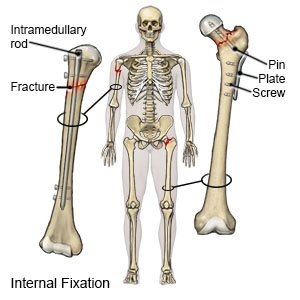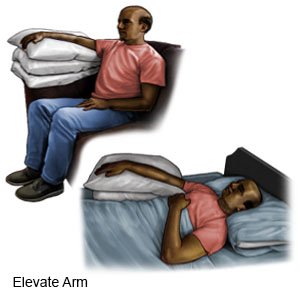ORIF of an Arm Fracture
Medically reviewed by Drugs.com. Last updated on Apr 6, 2025.
Open reduction and internal fixation (ORIF) of an arm fracture is surgery to fix a broken arm bone. Open reduction means the bones will be moved back into the correct position. Internal fixation means hardware (such as plates, screws, pins, or wires) is used to hold the bones in place while they heal.
 |
DISCHARGE INSTRUCTIONS:
Call your local emergency number (911 in the US) if:
- You suddenly feel lightheaded and short of breath.
- You have chest pain when you take a deep breath or cough.
- You cough up blood.
Seek care immediately if:
- Your arm or leg feels warm, tender, and painful. It may look swollen and red.
- Blood soaks through your bandage.
- You have numbness or weakness in your arm or fingers.
- Your fingers look pale or blue, feel numb, or tingle.
Call your doctor or surgeon if:
- Your cast or splint breaks or gets damaged or begins to smell.
- You have a fever.
- Your cast gets wet.
- You have more pain or swelling than you did before the cast or splint was put on.
- Your wound is red, swollen, or draining pus.
- You have questions or concerns about your condition or care.
Medicines:
You may need any of the following:
- Prescription pain medicine may be given. Ask your healthcare provider how to take this medicine safely. Some prescription pain medicines contain acetaminophen. Do not take other medicines that contain acetaminophen without talking to your healthcare provider. Too much acetaminophen may cause liver damage. Prescription pain medicine may cause constipation. Ask your healthcare provider how to prevent or treat constipation.
- Blood thinners help prevent clots from forming in the blood. Clots can cause strokes, heart attacks, and death. Blood thinners make it more likely for you to bleed or bruise. Use an electric razor and soft toothbrush to help prevent bleeding.
- Antibiotics help fight or prevent an infection caused by bacteria.
- Take your medicine as directed. Contact your healthcare provider if you think your medicine is not helping or if you have side effects. Tell your provider if you are allergic to any medicine. Keep a list of the medicines, vitamins, and herbs you take. Include the amounts, and when and why you take them. Bring the list or the pill bottles to follow-up visits. Carry your medicine list with you in case of an emergency.
Self-care:
- Ask about activity. Your healthcare provider may want you to move your fingers or elbow soon after surgery. Ask your healthcare provider about weight and activity limits.
- Ask when you can bathe. When you are allowed to bathe, cover your cast with 2 plastic bags. Tape the bags to your skin to keep the water out. Keep the cast out of the water so it does not get wet. If you do not have a cast, carefully wash the wound with soap and water. Dry the area and put on new, clean bandages as directed. Change your bandages when they get wet or dirty.
- Apply ice to the surgery area. Ice helps decrease swelling and pain, and prevents tissue damage. Use an ice pack, or put crushed ice in a plastic bag. Cover it with a towel and place it on your arm, cast, or splint for 15 to 20 minutes every hour or as directed.
- Elevate your arm. Keep your arm above the level of your heart as often as you can. This will help decrease swelling and pain. Prop your arm on pillows or blankets to keep it elevated comfortably.

Cast or splint care:
- Check the skin around the cast or splint every day. Apply lotion on any red or sore areas.
- Do not push down or lean on any part of the cast or splint.
- Do not scratch the skin under the cast with any sharp or pointed object inside the cast.
- If your splint is too tight, gently loosen it so that your fingers are comfortable.
- Wiggle your fingers often to help relieve or prevent swelling.
Go to physical therapy, if directed:
A physical therapist teaches you exercises to help improve movement and strength, and to decrease pain.
Follow up with your doctor or surgeon as directed:
You will need to return to have your wound checked and stitches or staples removed. Write down your questions so you remember to ask them during your visits.
© Copyright Merative 2025 Information is for End User's use only and may not be sold, redistributed or otherwise used for commercial purposes.
The above information is an educational aid only. It is not intended as medical advice for individual conditions or treatments. Talk to your doctor, nurse or pharmacist before following any medical regimen to see if it is safe and effective for you.
Further information
Always consult your healthcare provider to ensure the information displayed on this page applies to your personal circumstances.
